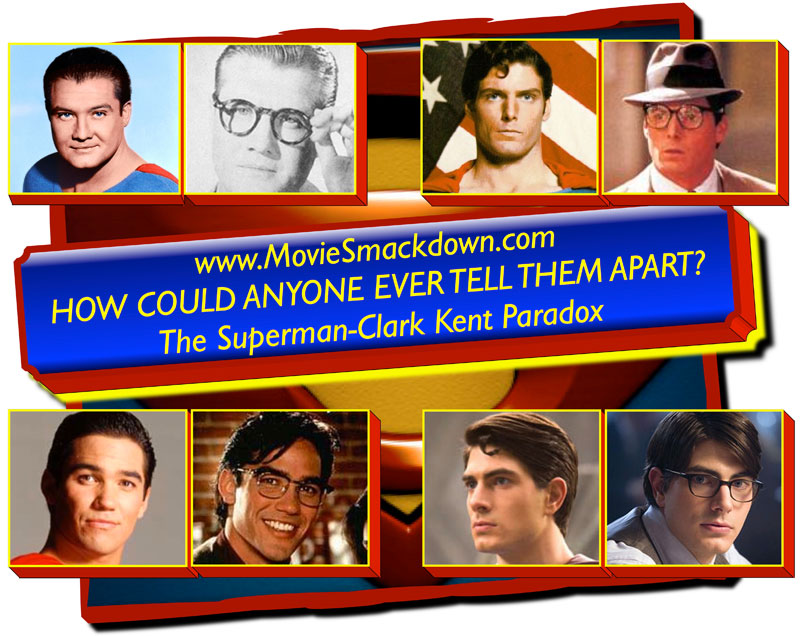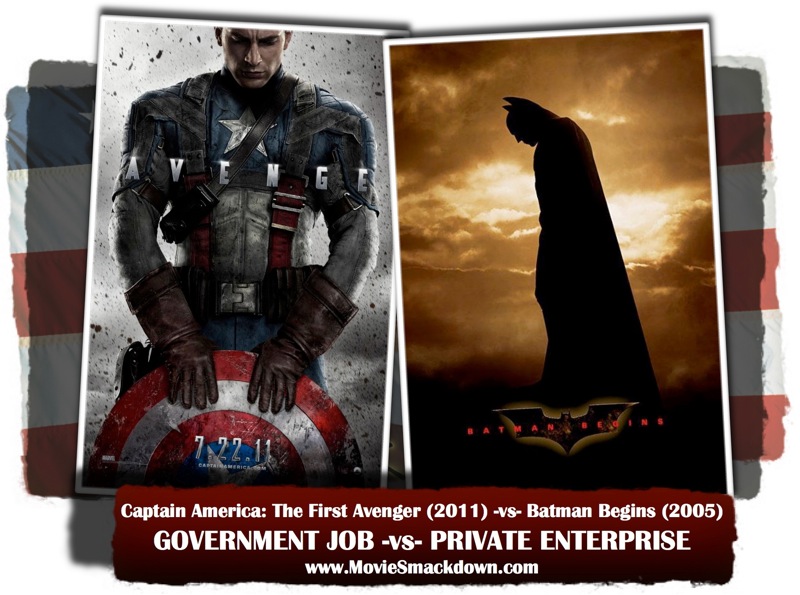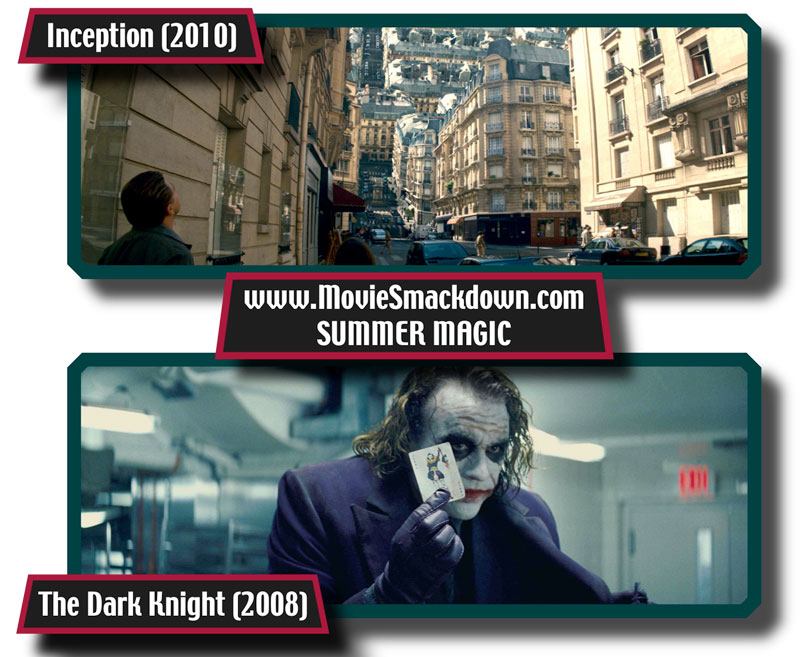 Friday at 12:01 a.m., the first batch of non-critic moviegoers will see “Inception”, Christopher Nolan’s new sci-fi existential heist flick. Â This week, critics spiralled into an ego war, some lauding the film as a cinematic masterpiece while others decried it as a cinematic con job. Â Even now, tempers are flaring with the RottenTomato meter hanging in the balance.
Friday at 12:01 a.m., the first batch of non-critic moviegoers will see “Inception”, Christopher Nolan’s new sci-fi existential heist flick. Â This week, critics spiralled into an ego war, some lauding the film as a cinematic masterpiece while others decried it as a cinematic con job. Â Even now, tempers are flaring with the RottenTomato meter hanging in the balance.
Meanwhile, industry execs have kept a wary eye on “Inception”‘s marketing campaign, and are even more eager to see the film’s opening box office numbers. Â What has garned all this interest and controversy?
As many reviews have stated, “Inception” is one of too few original films coming out recently that is not based on any pre-existing property and seems to be marketed mainly for adults. Â If you take a moment, most moviegoers would be surprised by just how many “adapted” materials hit the screens nowadays, as opposed to say the 80s or 90s when spec scripts so frequently were bought and produced.
On top of this, “Inception” has kept many of its main plot points secret, relying on the unusual visuals of its trailers and the star power attached to it to garner audiences interest.  The traditional industry tracking agencies have struggled to track interest in “Inception,” somehow unbelievingly ignoring it’s trending on Twitter and other social networking sites.  The hype and interest surrounding “Inception” — from an industry standpoint — resides in the abysmal box office summer where nearly every film — regardless of its proven market pre-existing property or star power attached — has underperformed miserably.  Even “Twilight: Eclipse” saw a 60+% drop-off in tickets its second weekend, spelling doom for the film’s box office longevity.  The only films so far to over-perform are children’s flicks, which guarantee at least two tickets for every targeted member of the demographic (parents have to accompany their kids).
A Deadline article recently reported that studio executives were taking emergency meetings with talent agencies such as CAA and William Morris Endeavor, pleading with agents and gurus to tell them what they’re doing wrong.  These agencies told them what moviegoers have known and been showing studios for the past decade: give us something original and fresh and good.  So, here I am, a young writer, about to tell you in all my hubris the fundamental reason behind the box office crisis and why “Inception” represents an important first step in fixing it:
Consumer trust.
Let’s take a step back and imagine a scenario. Â Imagine tomorrow, the US Government decides to regulate the movie industry. Â It institutes a refund policy whereby moviegoers can receive a full refund on their movie ticket if they exit a movie within the first thirty minutes of watching it. Â Basically, you don’t like the movie, you get your money back. Â Imagine this regulation’s impact across studios? Â What would happen?
Almost assuredly, I’ll tell you: the quality of films would improve over time.
The end goal of any movie studio is to make money. Â This is understandable. Â However, what has happened in recent years is that the means to making that money has switched. Â Instead of making a good film that earns money, studios are more interested in finding ways to charge more for subpar films. They don’t trust film to make money — film being a good story with good characters that engages audiences. Â Oddly enough, studios are selling a product they no longer believe in anymore!
Look at the 3D hype. Â The “logic” goes like this: “If we make it 3D, we can charge $20 a ticket instead of $10 and even if its crap, we’ll make money!” Â Now, the logic doesn’t go on to conclude that most families — especially in this economy — do not have $80 to take themselves and their two kids to see Toy Story 3. Â And as more 3D films pack the weekends, the choices available to most people will prove moot due to financial restrictions. Â Now some say this may drive up competition, but in the end the studios will more than likely try to find another bell or whistle to slap on it to make it better. Â And you know what? Â They’ll fail…miserably.
Or studios think: “hey, 8 million people bought this book, we’ll turn it into a movie” or “this TV show was really popular in its heydey, let’s make it a movie.” Â But what’s happened? Â People have seen or read this before and really don’t want to drop $20 to go see something they’ve already seen. Â They’ll wait for the DVD, which almost invariably hits stores in two months time. Â So this again can only last so long.
But what’s missing in all of this? Â Why does and will this all fail?
Quality control. Â The auto industry learned this the hard way. Â No matter how many DVD players you put into a car or how sexy the car looks, it the car runs like crap it’s not gonna sell. Â The movie industry is essentially building a minivan that runs crappy, slapping on some colorful stickers and a DVD player, and then — this is also important — trying to get EVERYONE to buy just this one mini-van. Â Only when we buy this mini-van, we don’t get to test drive it or return it. Â We have to accept we hate this car and the $12 bucks we spent to get it. Â And yet, despite audiences having a bad experience with this one mini-van, studios figure we’ll come back and buy the mini-van (with different bells and whistles) again once we’re done with this one? Â Again though, imagine if the studios had to take accountability and refund audiences if they walk out in the first 30 minutes?
Anyone who has passed their 10th grade economics class can tell you the number one thing that results in higher profits for any business: better product that caters to demand.  If you produce and sell the better product, you make the most money.  Even if the product is more expensive, you will still make the profit.  Just look at Apple.  They’ve created a brand that is specifically targeted toward a loyal consumer base and sells at a higher price point than its competition.  This loyalty has become infectious, creating a demand for their products that guarantees higher profits.  Now they are one of the richest corporations on the planet.  One of the keys is that Apple successfully linked what customers want to what will make them money.
Why haven’t studios?  Studios want to make money using 3D and just generally higher ticket prices.  They attempt to make one movie that will cater to EVERYONE, thinking EVERYONE will go see it.  Then they sit back and bemoan why people aren’t showing up to their movies anymore (it took us long enough to catch on to this though) — and why everyone is dissatisfied, feels they were charged too much for a diluted, safe movie that didn’t seem geared specifically to them and was easily predictable because it took no risks out of fear of alienating a particular quadrant of the demographic chart.  This has gone on for so long that people simply do no trust studios and the moviegoing experience enough to pay the inflated prices to go see movies at poorly-maintained and poorly-operated theaters.  Abandoning quality control, studios have lost consumer trust as audiences assume a film will be crap, the same old crap they saw last summer and not worth the money, that the theater will be full of undisciplined patrons, and thus they are better off staying home and watching cable.  Why cable?
Because cable still believes in niches, they’re not trying to construct an “omni-movie” that tries to get EVERYONE to watch it — also, a TV series has to have an eye on quality in order to get audiences back NEXT WEEK to continue watching the show. Â If you took “Breaking Bad” into a studio and wanted to make it a movie, the studio exec would say “It’s too dark and kids and girls won’t go see it.” Â Yet, the kids and girls who don’t watch “Breaking Bad” haven’t seemed to hurt AMC’s ratings, has it? Â Or “Lost”: if you were a newbie writer and went into a studio, they’d say “It’s too hardcore sci-fi and too complicated.” Â Yet that hasn’t hurt ABC’s DVD sales and syndication bonuses, has it? Â These shows found a niche and maximized their profits from catering to it and not that niche tempered by four other totally unrelated niches.
Studios want the “omni-film,” the film that will make money from everyone. Â Hate to break it to them. Â That rarely exists and works. Â The result is a movie that caters to no one and is so predictable. Â For example, over the past decade, studios have killed the “dark film”, and as a result almost completely annihilated its adult demographic from going to the movies to see serious fare. Â And what do they do? Â They and theaters raise prices to compensate for this which only further puts a strain on the remaining adults still willing to give it a go.
It’s a self-defeating model of business that no doubt is now resulting in this horrid box office summer. Â And it doesn’t even take into account the backward distribution model used by studios nowadays, and the inflated budgets that violate the base economic rule of making a better product at a cheaper cost to yourself.
Anyway, how does this link to “Inception” and make it matter? Â Well, the film contains many of the elements that can save studios. Â It’s the “iPhone” of films this s
ummer. Â It is clearly marketed toward a niche, who if they like its reported complexity, will return for multiple views that will only boost its box office totals. Â Form there, their word of mouth of ” you have to see it” will only ensure further ticket sales based on its quality as secondary demographics give the film a chance because of all of the hype.
Furthermore, fans of the film will no doubt become loyal, buying the DVD, Blu-Ray, etc. and will no doubt continue to follow anything that Christopher Nolan (and thus WB) puts their name on. Â What is happening here? Â WB and “Inception” have made a film that will try to BUILD brand loyalty in a specific niche with its quality, rather than tap into some pre-existing imaginary Jungian wellspring of billions of dollars by making the movie that caters to everyone in everyway.
But who knows how “Inception” will fare.  Audiences are tired of summers films and, as I said, there is no consumer trust in studios anymore to think that “Inception” is any different than a clever marketing ploy.  “Inception” may have come too late, or is simply the first strike against the wall of the industry’s self-destructive business practices. But as word-of-mouth spreads, I can only hope “Inception” shows studios just how out of touch they’ve been, and how much more money they could’ve been making if they’d focused first on giving particular audiences want they want.  And it’d behoove all moviegoers who are tired of the plethora of bad films in the market to go and vote with your film ticket.
But I guarantee you this.  If that US regulation went through, you’d see an upsurge in people going to the movies.  And you’d see such a tremendous spike in the quality of the films, as like a cable network that has to keep its audience loyal to a show, studios start having to actually consider what is going to keep their audiences in their seats.
And what’s that?
A really good movie.
Who knew?




Also Dark_enV,
I agree with the fact that Toy Story 3 was fantastic, and that not every film has to be completely original to be great, but I would say that originality cannot escape the film completely.
Even though Toy Story 3 relied heavily on the original Toy Story for many of the key elements we all loved (like the brief stint when woody had to fight buzz), but I think it took the story to new places at the same time (like their near death experience at the furnace–btw did you almost cry then too?). In fact, I’d say the relationship between original material and sequel material really creates a new dynamic–i.e. it creates something more original.
Fantastic ideas!
I read this article before the midnight showing, and my first reaction was, “Yeah, it looks great, but the savior of the industry? Come on.” Your assessment of the industry’s current state and needs seemed accurate enough, but could Nolan pull it off?
By 2 am I more than agreed with you Beau. If any movie can save the industry, it would be the one that balanced a mind blowing experience with an emotionally magnetic host of characters/story.
Only these next few weeks will tell if it rakes in the money it needs to prove to the execs that the investment is worth it. All I know is, if my money can shape the industry, and move the stories in the direction Nolan is heading, then I’ll return for seconds (and probably thirds).
Outstanding, thanks for the best laugh I’ve had today. Now I won’t have to buy a ‘manbag’ to smuggle in those treats.
Believe it or not Jay, some of the theaters here in L.A. are now turning a passive eye to people bringing in snacks and other items. Watched a woman walk in with a Chipolte burrito the other night
Hear him! Hear him! And as long as we’re fantasizing about the theaters, let’s imagine we’ll be allowed to forgo the popcorn and a single drink for $9.50 and bring in our own snacks. Good article.
You are absolutely correct. Hollywood is all about the easy money, ticket prices have gone up, 3D has been abused to just add on to make the extra $ and quality in films today have gone down so much. Leaving Inception out of the picture, only one true film has stood out as something that is a film with true quality and that is Toy Story 3. Though it is a sequel and it uses 3D this film is something that all can enjoy with so many strong elements and fun for everyone. Pixar is smart in making films to tell stories that are worth telling so people can enjoy a great movie. Inception is well likely to be the next film that will have tremendous quality in all areas. Christopher Nolan doesn’t make movies for money or because he has nothing better to do, he does it because he loves the art of making movies, it’s his passion. When Nolan was presented with converting Inception into 3D he ended up saying no, not because he didn’t like it but for him there really was no need and the process would delay the release of the film. Nolan has even said he’s not against 3D, 3D is a tool to help tell the story but it’s not always needed, it can add so much to a film but Hollywood doesn’t care about what it can add to the quality of the film, they’re looking at how it can add to the box office numbers. I love how when people ask him about the next Batman movie or the upcoming Superman, he tells them “I focus on one movie at a time” he’s focused completely on making films great and making them to the best of his ability so we the audience can have a great time at the movies. I truly hope this film will open up and slap Hollywood in the face to show what they’ve been missing for some time now, quality. Not ever film has to be original to be great, Toy Story 3 proves that. Anyway great article, very good stuff.